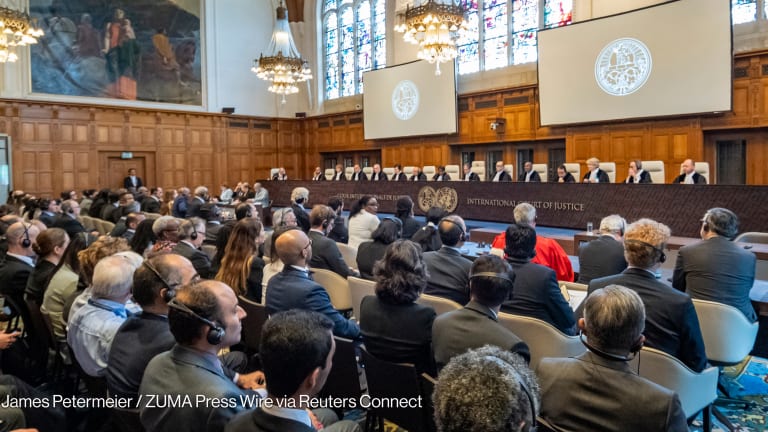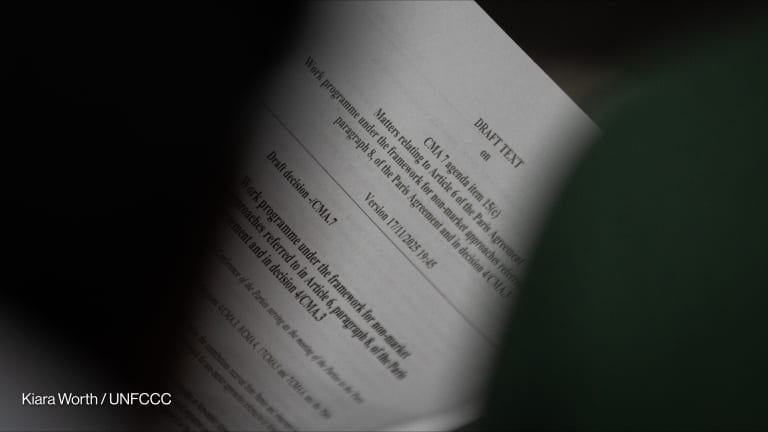What it’s really like to work on the front lines of climate change
Those living on small islands are among the first in the world to bear witness to the brutality of climate change. For those also working on climate action, the context is unlike any other. They tell Devex what it’s really like.
As the South Pacific Ocean laps at the 83 islands that make up the nation of Vanuatu, it takes with it little pieces of Willy Missack’s homeland. Coastal erosion is just one of the challenges the low-lying country faces. There’s the annual cyclone season that destroys roads and houses, the rising sea levels driving communities to move, and the drought that dries up the limited agriculture that already exists. Against the backdrop of climate challenges, Missack, one of the architects behind Vanuatu’s request for the International Court of Justice’s opinion on the obligations of States on climate change, continues his work as a national climate consultant. He drives policy change and represents Vanuatu at global dialogues. Living and working in the context of a small island developing state, especially one “located in the ring of fire and a cyclone belt,” is different from working on climate action from elsewhere, he said. Small Island Developing States, or SIDS — of which there are 39 scattered in remote locations across the Caribbean, the Pacific, the Atlantic, the Indian Ocean, and the South China Sea — are considered the most vulnerable to climate change despite being the lowest contributors to the problem. The United Nations estimates that SIDS have produced less than 1% of greenhouse gas emissions since 1990. As climate change and biodiversity loss increasingly lay claim to their shores, those living there become the first witnesses to its true impacts. For those working on climate action or disaster risk reduction in these contexts, the limited resources, governance gaps, and remote locations make it a unique context in which to operate. “Working in the field in a climate-vulnerable country is much more challenging than working in an international space,” said Shaha Hashim, field project manager for the Blue Marine Foundation in the Maldives. Devex asked climate professionals from SIDS why that might be and what it’s really like to work in this context. The work is more than a job but a matter of survival Devex’s jobs board currently lists climate-focused positions in the United Kingdom, Italy, and Kenya. While these countries face their own climate challenges, the chosen candidates will likely be able to do their work without seeing the destructive impacts of storms, floods, and droughts each day. For those working on the issue in an SID, the constant threat of disaster means their job is intertwined with their own survival and that of their country and culture, making their work more of a vocation. “I don’t feel like this work is a job. It’s something we need to do in order to live and thrive on our islands and to have a future in the Maldives,” explained Hashim. Serena Pickering, former lead of the International Union for Conservation of Nature’s Global Youth Summit Oceania region hub, lives in Fiji where storm surges are common and sea levels are rising. She is motivated to work on the issue: “I want a sustainable future for my kids.” That’s something that may not be possible in Fiji unless its 160 adaptation measures are implemented. Dealing with disasters on a daily basis, and the looming threat of destruction to your country can take its toll. “What I observe is the irony that the field that we work in is intended to build the resilience of communities and nations and regions, but I feel like there’s not many avenues to focus on your own personal resilience,” said Kerry-Ann Thompson, a resilience adviser from Jamaica working across the Caribbean and Africa, who has experienced burnout and now works part-time as a result. While this might affect anyone working in the space, she believes there is a uniqueness in islands “of the fact that we have multiple threats at any given time and that we’re expected to respond to those.” Elsewhere in the world, Sasha Jattansingh, a loss and damage expert at Climate Analytics in Trinidad and Tobago with over 15 years of experience, says that terms such as the “frontlines of climate change” and “canaries in the coal mines” are commonly used to describe the status of these countries, but their full gravitas and implications for individuals may not be fully understood. “Canaries in the coal mines were the first indicators of any gas leak in coal mines so were the first to die and when you really think about it, you have entire countries obliterated for climate change,” she said. Job opportunities are limited Despite SIDS being the most vulnerable countries to climate change, there are limited opportunities to work on the topic from the ground, said the interviewees. According to the Organisation for Economic Co-operation and Development, SIDS have smaller job markets, which means it doesn’t attract the expertise needed. Despite her experience and being a part of The Asia Foundation’s Pacific Women Climate Leaders Fellowship Program, Pickering is unable to find a position in the sector and is currently having to work as an administrative assistant in a different sector. “I have to take what job comes my way,” explaining that any climate-related jobs that do exist will likely go to men. “As a Pacific islander, it’s always seen that men are more powerful than women.” That same job scarcity is part of the reason Masaō Ashtine, an energy consultant from Trinidad and Tobago and co-founder of the Journal of Caribbean Environmental Sciences and Renewable Energy, is based in the U.K. He’s been repeatedly told that there is a need for his expertise back home, but no funding to facilitate it. “It’s quite difficult to climb the ladder and to advance your career,” he said. Of the jobs that do exist, Jattansingh said the contracts are short-term and projectized despite climate change being a long-term issue. The focus is more on adaptation Given SIDS’ low contribution to carbon emissions, climate action in these contexts is less about converting to clean energy but finding ways to withstand and adapt to the onslaught of disasters. “While we do see the importance of mitigation, we’re actually emphasizing climate change adaptation and what the future could look like and how we need to cope with it,” said Thompson. “We’re going to lose a lot of our shorelines. We’re going to lose some of our economies or industries because of that. And how are we going to keep going?” With that in mind, locals are best placed to work in this context, said Thompson because that experience is already lived. “You are needed because you are living the realities of climate change. You’re living the realities of experiencing disasters and so you are not only the expert in terms of qualifications that you carry, but also the experiences that you have,” she said. Missack believes operating from an SID gives a person a unique skill set and that other places around the world will be able to learn from the individuals tackling the issue head-on. “It is a blessing to be an SID because it makes us united and that is the hope that people see,” said Missack, adding that this sense of unity doesn’t always exist in other countries. “I have no doubt the world will one day learn from Vanuatu.”
As the South Pacific Ocean laps at the 83 islands that make up the nation of Vanuatu, it takes with it little pieces of Willy Missack’s homeland. Coastal erosion is just one of the challenges the low-lying country faces. There’s the annual cyclone season that destroys roads and houses, the rising sea levels driving communities to move, and the drought that dries up the limited agriculture that already exists.
Against the backdrop of climate challenges, Missack, one of the architects behind Vanuatu’s request for the International Court of Justice’s opinion on the obligations of States on climate change, continues his work as a national climate consultant. He drives policy change and represents Vanuatu at global dialogues. Living and working in the context of a small island developing state, especially one “located in the ring of fire and a cyclone belt,” is different from working on climate action from elsewhere, he said.
Small Island Developing States, or SIDS — of which there are 39 scattered in remote locations across the Caribbean, the Pacific, the Atlantic, the Indian Ocean, and the South China Sea — are considered the most vulnerable to climate change despite being the lowest contributors to the problem. The United Nations estimates that SIDS have produced less than 1% of greenhouse gas emissions since 1990. As climate change and biodiversity loss increasingly lay claim to their shores, those living there become the first witnesses to its true impacts.
This article is exclusively for Career Account members.
Unlock this article now with a 15-day free trial of a Devex Career Account. With a Career Account subscription you will get:
- Full access to our jobs board, including over 1,000 exclusive jobs
- Your Devex profile highlighted in recruiter search results
- Connections to recruiters and industry experts through online and live Devex events
Start my 15-day free trialAlready a user?
Printing articles to share with others is a breach of our terms and conditions and copyright policy. Please use the sharing options on the left side of the article. Devex Pro members may share up to 10 articles per month using the Pro share tool ( ).
Rebecca L. Root is a freelance reporter for Devex based in Bangkok. Previously senior associate & reporter, she produced news stories, video, and podcasts as well as partnership content. She has a background in finance, travel, and global development journalism and has written for a variety of publications while living and working in Bangkok, New York, London, and Barcelona.








